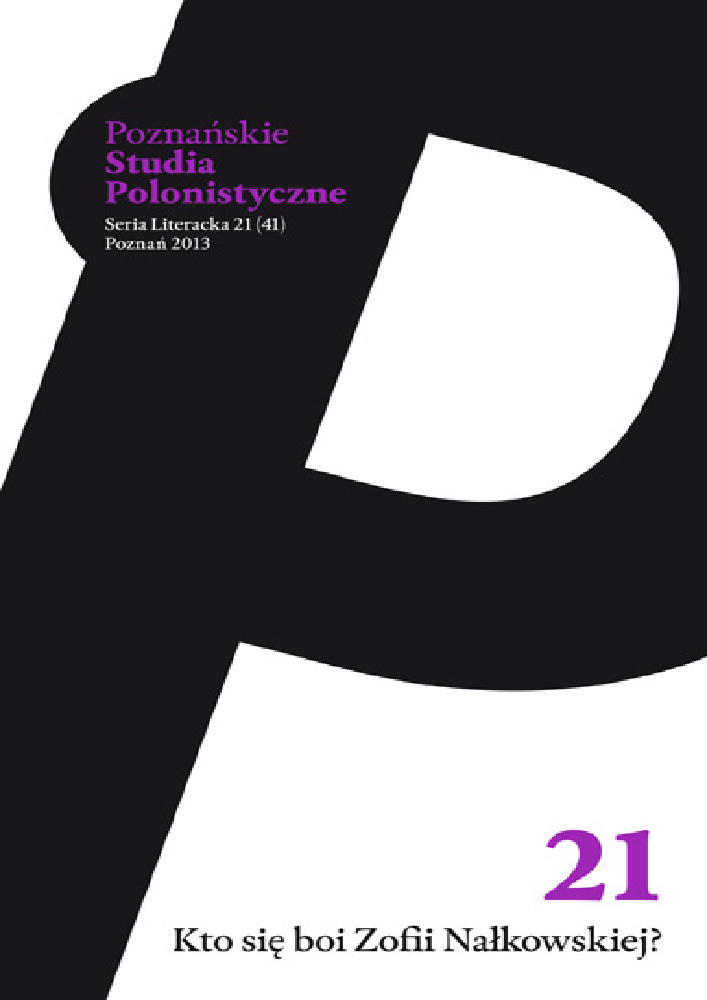Abstrakt
The author presents a survey of the mode of functioning of the category of failure in the context of phenomena describes as the anti-social turn in queer theory. In the focus of analysis there are, among others, works by Leo Bersani, Lee Edelman, José Esteban Muňoz. The article is mainly devoted to the ideas presented in Judith Halberstam’s The Queer Art of Failure (2011), a study that critically revises the relation connecting queerness with the concepts of negativity, shadow feminism, and designs a new perspective for queer research in popular culture, referring to Stuart Hall’s concept of low theory, and to Antonio Gramsci’s culture analysis.
Bibliografia
Bersani L., Homos, Cambridge–Massachusetts–London 1996.
Butler J., Afterward. After Loss, What Then?, w: Loss, red. D.L. Eng, D. Kazanjian, London 2003.
Butler J., Bodies That Matter: On the Discursive Limits of „Sex”, London–New York 1993.
Butler J., The Lesbian Phallus and the Morphological Imaginary, w: eadem, Bodies That Matter : On the Discursive Limits of „Sex”, London–New York 1993.
Butler J., The Psychic Life of Power: Theories in Subjection, Stanford 1997.
Cvetkovitch A., An Archive of Feelings. Trauma, Sexuality, and Lesbian Public Cultures, Durham–London 2003.
Duggan L., The New Homonormativity. The Sexual Politics of Neoliberalism, w: Materializing Democracy: Toward a Revitalized Cultural Politics, red. Castronovo R., D.D. Nelson, Durham–London 2002.
Edelman L., Against Survival: Queerness in a Time That’s Out of Joint, „Shakespeare Quarterly” 2011, t. 62, nr 2.
Edelman L., No Future. Queer Theory and the Death Drive, Durham––London 2004.
Fuss D., Identification Papers, New York 1995.
Halberstam, Gaga Feminism: Sex, Gender, and the End of Normal, London 2012.
Halberstam J., In a Queer Time and Place: Transgender Bodies, Subcultural Lives, New York 2005.
Halberstam J., Shame and White Gay Masculinity, „Social Text” 2005, nr 84–85.
Halberstam J., The Anti-Social Turn in Queer Studies, „Graduate Journal of Social Science” 2008, t. 5, z. 2, s. 140–156.
Halberstam J., The Queer Art of Failure, Durham–London 2011.
Haschem E., Kilian E., Michaelis B., Introducing Queer Futures, w: Queer Futures. Reconsidering Ethics, Activism and the Political, Berlin 2013.
Leslie E., Mickey Mouse Utopia and Walter Benjamin, w: eadem, Hollywood Flatlands: Animation, Critical Theory and The Avant-Garde, London 2002, s. 80–123.
Love H., Feelings Backward. Loss and the Politics of Queer History, London 2007.
Muňoz J.E., Disindetifications: Queers of Color and the Performance of Politics, Minneapolis 1999.
O’Rourke M., Toward a Non-Queer Theory,
http://www.academia.edu/2175921/Toward_a_Non-Queer_Theory [dostęp: 8 marca 2013].
Puar J., Terrorist Assemblages: Homonationalism in Queer Times, Durham–London 2007.
Warner M., Queer and then?, „Chronicle Review”, 1 stycznia 2012, http://chronicle. com/article/QueerThen-/130161/ [dostęp: 8 marca 2013].
Warner M., The Trouble with Normal. Sex, Politics, and the Ethics of Queer Life, Cambridge–London 1999.
Weiner J.J., D. Young, Introduction. Queer Bonds, „GLQ. A Journal of Lesbian and Gay Studies” 2011, t. 17, nr 2–3, s. 233–241.
What’s Queer About Queer Studies Now?; E. Kosofsky-Sedgwick, Touching Feelings. Affect, Pedagogy, Performativity, Durham–London 2003.
Licencja
Autorzy
Autorzy tekstów przyjętych do publikacji w czasopiśmie „Poznańskie Studia Polonistyczne. Seria Literacka” są zobowiązani do wypełnienia, podpisania i odesłania na adres redakcji umowy o udzielenie nieodpłatnej licencji do utworów, z zobowiązaniem do udzielania sublicencji CC.
Zgodnie z umową, autorzy tekstów opublikowanych w czasopiśmie „Poznańskie Studia Polonistyczne. Seria Literacka” udzielają Uniwersytetowi im. Adama Mickiewicza w Poznaniu niewyłącznej i nieodpłatnej licencji oraz zezwalają na użycie sublicencji Creative Commons Attribution-NoDerivatives 4.0 International (CC BY-ND 4.0).
Autorzy zachowują prawa do dalszego, swobodnego rozporządzania utworem.
Użytkownicy
Zainteresowani użytkownicy internetu uprawnieni są do korzystania z utworów opublikowanych od 2016 roku w „Poznańskich Studiach Polonistycznych. Serii Literackiej” pod następującymi warunkami:
- uznanie autorstwa – obowiązek podania wraz z rozpowszechnionym utworem, informacji, o autorstwie, tytule, źródle (odnośniki do oryginalnego utworu, DOI) oraz samej licencji;
- bez tworzenia utworów zależnych – utwór musi być zachowany w oryginalnej postaci, nie można bez zgody twórcy rozpowszechniać np. tłumaczeń, opracowań.
Do wszystkich tekstów opublikowanych przed 2016 r. prawa autorskie są zastrzeżone.
Inne
Uniwersytet im. Adama Mickiewicza w Poznaniu zachowuje prawo do czasopisma jako całości (układ, forma graficzna, tytuł, projekt okładki, logo itp.).
